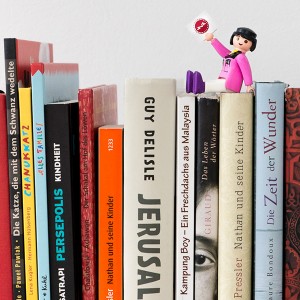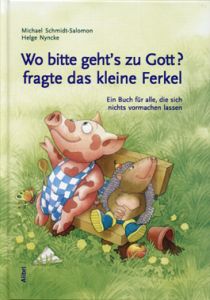During the week of October 21 to 27, 2013 the Academy of the Jewish Museum Berlin, in cooperation with Kulturkind e.V., will host readings, workshops, and an open day for the public with the theme “Multifaceted: a book week on diversity in children’s and young adult literature.” Employees of various departments have been vigorously reading, discussing, and preparing a selection of books for the occasion. Some of these books will be introduced here over the course of the next few months.  In order to be able to recommend books, we had to choose a focus and select appropriate books. It was clear from the start that finding good books about migration and coexistence was important to us. And we also considered the meaning of religion as a topic. Interestingly, everyone in our reading group agreed that we should include books with Islamic themes as well as Jewish ones. At the beginning, we hesitated as to whether to add books about Christianity, but ultimately decided to select narrative children’s and young adult books that represent all three religions. And we hope to be able to recommend a number of them.
In order to be able to recommend books, we had to choose a focus and select appropriate books. It was clear from the start that finding good books about migration and coexistence was important to us. And we also considered the meaning of religion as a topic. Interestingly, everyone in our reading group agreed that we should include books with Islamic themes as well as Jewish ones. At the beginning, we hesitated as to whether to add books about Christianity, but ultimately decided to select narrative children’s and young adult books that represent all three religions. And we hope to be able to recommend a number of them.
It was in this context that I came across the book, Wo bitte geht’s zu Gott?, fragte das kleine Ferkel (Which is the Way to God, Please? Little Piglet Asked) by Michael Schmidt-Salomon with pictures by Helge Nyncke. The title reminded me of our children’s tour, Alis wunderbarer Weg (Ali’s wonderful path), which is based on our colleague Shlomit Tulgan’s book of the same name. The tour takes children on a search for objects that tell stories of different people’s efforts to connect with God. In his book, Schmidt-Salomon ends the search for God with the insight that “He who knows God, is missing something.” Although I don’t object on principle to atheism appearing in a children’s book – I think the young ones should certainly be exposed to many religious standpoints and beliefs – the quote raises the question of how the atheistic position should be portrayed appropriately.
After the publication of Schmidt-Salomon’s book in 2007, the Federal German Ministry of Family Affairs, Senior Citizens, Women and Youth made a motion to include it on the list of literature considered likely to endanger or negatively influence young people. The argument behind this was that “the book disparages the three great world religions: Christianity, Islam, and Judaism” and that it also depicts “the Jewish religion as particularly inhumane, vicious, and uncompassionate.” In fact, on their search for God the little piglet and the hedgehog encounter several unappealing aspects of each of the great religions: the rabbi tells them about the destruction of all life during Noah’s Flood, provoking the piglet to ask: “All human babies, all grannies, and all animals?” The rabbi justifies God’s decision by explaining that people had been praying to other gods. (If Mr. Schmidt-Salomon had taken a look in the Torah, he would have discovered that Noah’s contemporaries were actually being punished for their wickedness!) Christians are depicted as man-eaters – “These are cannibals! If they even eat Mister God’s son, who knows what they’ll do to little hedgehogs and piglets…” – and Muslims as having an obsession with cleanliness, though the author doesn’t differentiate between taking a bath and symbolic cleanliness. In the illustrations, Muslims appear as a grey mass and the rabbi as a teeth-baring monster.

Multifaceted: a book week on diversity in children’s and young adult literature © Jewish Museum Berlin, photo: Nadja Rentzsch
Even though the Ministry’s motion was rejected in 2008, the book continued to receive a great deal of criticism. Stephan J. Kramer, Secretary General of the Central Council of Jews in Germany, refused to classify it as anti-Semitic, writing that the book “vilifies all three great monotheistic religions equally,” but cautiously adding that “freedom of opinion and artistic freedom are important, but they shouldn’t be abused.” This remark naturally leads us to the important question: when does the critique of religion go so far that it insults its followers? Here we might recall the discussion about the caricatures of the Prophet Mohammed. How would that story have developed if the caricatures had been explicitly targeted at children? Even though “Which is the Way to God, Please? Little Piglet Asked” passes itself off as a children’s book, I don’t believe it is suitable for children. Aside from fomenting prejudice, it features a series of substantial errors. Criticizing religion should not be forbidden in a democratic country, but the writer should at least engage in more rigorous research beforehand. Dear Mr. Schmidt-Salomon, non-Jews are allowed to visit synagogues – in fact, they are absolutely welcome guests!
The newspaper Die Welt came to this conclusion: “The atheist work is actually too bad to be censored.” I myself agree wholeheartedly with Alan Posener, who writes in his article: “Children’s books that claim to entertain but actually try to indoctrinate are the real plague.”
Diana Dressel, Education
Michael Schmidt-Salomon, Helge Nyncke: Wo bitte geht’s zu Gott?, fragte das kleine Ferkel, Aschaffenburg: Alibri Verlag 2007. Official (unpublished) English translation at: http://ferkelbuch.de/ferkelbuch.pdf
